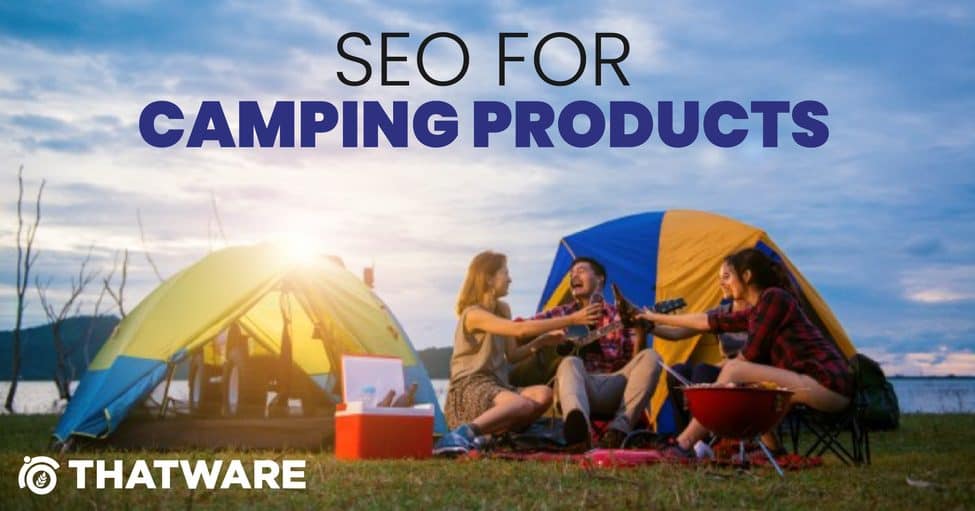FILL OUT THE FORM BELOW & ALLOW US TO TAKE YOUR SEO FOR CAMPING PRODUCTS ONLINE TO A WHOLE NEW LEVEL!
When you write content for your website, you can make it do a lot of things. We are produce SEO For Camping Products Online. The number of people who go camping each year in the United States has remained stable at about 40 million. That’s a lot of people who will need camping gear, gear, and other supplies for their vacations.
If you sell camping equipment, this is fantastic news for you. The key now is to figure out how to get in touch with them. What better way to do that than by using the internet?

This is where you can use a variety of SEO strategies to entice your target audience. Continue reading if you’re not sure how this can help your camping business.
Let’s take a closer look at how SEO solutions are used.
1. Blogging Aids in the Promotion of Camping
There isn’t a single industry that can’t produce content that caters to its target audience. You should have a blog because you’re in the camping industry. There are a plethora of interesting subjects about which you can write to pique your audience’s interest.
In the dynamic landscape of digital marketing, blogging emerges as a powerful tool for promoting camping ventures. Within the camping industry, a blog becomes a valuable platform to engage the target audience effectively. Whether you specialize in camping tents, backpacks, or sleeping bags, the blog can cover diverse topics to captivate the interest of your audience. For instance, content can range from detailed guides on setting up tents to tips on maintaining warmth in sleeping bags during winter excursions.
For SEO for camping products online, camping enthusiasts perpetually seek the latest gear and invaluable insights, often resorting to online searches. Neglecting search engine optimization (SEO) means missing out on a significant chunk of potential camping traffic. Establishing an online presence that aligns with popular search queries on platforms like Google ensures your camping products and tips reach a broader audience, thereby boosting your brand visibility.
If you sell camping tents, backpacks, and sleeping bags, for example, you will discuss how to set up tents. You may also discuss how to set up an adjustable tow hitch or how to keep warm in your sleeping bag during the winter.
Campers are still on the lookout for the best gear as well as helpful hints. And can you guess where they’re looking? Of course, there’s Google. You’re missing out on a lot of camping traffic if you’re not optimizing your site for search engines.
2. Segment the Camping Audience You Attract Using Keywords
You’ll need segmentation unless you’re a camping store selling items that cater to a large number of campers. Choosing keywords that cater to a particular group of people is one way to go about it.
For a camping clothing store, honing in on keywords like “camping shoes” and “camping clothes” proves instrumental. This approach allows you to align your online presence with the search behaviours of your target customers. By incorporating such keywords into your content and product descriptions, you increase the likelihood of attracting a more focused audience interested in camping apparel, thereby enhancing the effectiveness of your marketing efforts.
If you only sell camping clothing, for example, you might want to concentrate on keywords like “camping shoes” and “camping clothes.”
3. Use Local Keywords to Attract Customers
You can use local SEO solutions to improve your keyword optimization. You’ll be looking for keywords that involve unique cities and neighborhoods in this situation.
If you have a nearby brick-and-mortar company that you want to draw foot traffic to, this is crucial. This method can be used if you have a single store or several stores in a single state or several states.
This is just one approach for local SEO solutions, which leads us to the next stage.
4. Make a claim on local business directories for your business.
You have business pages published in the directories of Bing, Yahoo, and Google. These lists appear in the search engine results pages when users type in a product or service (SERPs).
This is crucial for attracting local traffic to your website and, ultimately, to your company. Perhaps more crucial is that you double-check that all of the details on your listings are correct and reliable.
The name, phone number, and address should all be consistent with your website and other business listings. If it doesn’t, the rating in the SERPs will suffer.
Furthermore, the customers would be perplexed as to which number to call or which address to visit. On all of your company’s websites, your URL should be consistent.
5. Make Your Company Pages More Effective
We’re still working on the company site. These are extremely valuable to companies, so they must be optimized. Your goods and services, as well as any main keywords you’re targeting, should all be listed in your business listings.
Photography will help make the listing more appealing to both prospects and search engines. The photographs you provide should be of high quality and show both the inside and outside of your company.
Then double-check that your listings’ categories are right. Most search engines let you choose between two and five categories for your company. It can hurt your rating if you’re uncategorized or miscategorized.
6. Use social media to connect with other campers.
Your content is excellent for driving organic traffic to your blog. But what if you started a two-way conversation with your clients and prospects?
Camping is a common pastime for both experienced and novice campers. This implies that there are many issues that must be addressed. As a camping business, you should have plenty of knowledge to share.
What better way to spread the word than via social media? After all, this is where customers go to communicate with brands and people that share their values or concerns.
Use social media to join in discussions, launch a couple, and provide top-notch customer service. To attract your audience, find out the platforms they use and create business pages or even camping groups on those platforms.
7. Keep track of your campaigns and keep an eye on them.
What other way would you know if your SEO strategies are effective? You can monitor your camping keywords, blog posts, and other marketing activities with tools like Google Analytics.
Make sure you don’t get caught up in vanity metrics like traffic, engagement, or followers. These are fantastic, but they aren’t the end goal. The ultimate aim is to turn visitors into consumers and return customers.
8. Consistently produce high-quality content
It’s fantastic that you have a camping blog. What good is it, though, if the material isn’t up to par? If you don’t produce high-quality content, both visitors and search engine bots will be turned off.
Keep in mind that you’re writing for your audience as well as your rating. If Google notices you stuffing keywords into your content or writing meaningless content, your SEO will suffer.
9. Conduct a competitor analysis
Check out the competition, just like every other marketing tactic. What are they doing, and how well are they doing it?
Identifying their flaws will assist you in identifying your own. If they aren’t using local keywords or social media, for example, you can use these as your selling points.
In the dynamic realm of marketing, conducting a comprehensive competitor analysis is a fundamental tactic to stay ahead in the game. Delving into the strategies employed by competitors provides invaluable insights into industry trends and customer preferences. By scrutinizing their approaches and evaluating their success, you gain a strategic advantage.
For SEO for amping products online, a meticulous examination of competitors not only unveils their strengths but also highlights potential areas for improvement. Identifying gaps or shortcomings in their use of tactics such as local keywords or social media platforms becomes a golden opportunity to distinguish your brand. If, for instance, competitors overlook the potency of local SEO or neglect effective social media engagement, these gaps can be leveraged as distinctive selling points for your own camping business.
Embracing a proactive stance fueled by competitor analysis ensures that your marketing endeavours are not only innovative but also responsive to the evolving landscape, ultimately positioning your camping enterprise for sustained success.
10. Video Content is the queen
If written content reigns supreme, video content reigns supreme. This is almost as critical as blogging. Consumers today spend hours upon hours on YouTube, Facebook, and other sites watching content.
This provides you with a fantastic opportunity to reach out to this market. Create video content that demonstrates how to use items and provides camping advice.
Be sure to use your main keywords in your video titles, descriptions, and tags.
Get Professional SEO Services
Knowing what types of SEO solutions you can use to support your brand is extremely beneficial. However, putting them to use is a different matter.
This is where digital marketing specialists can help. We provide a variety of online marketing services at ThatWare. This includes search engine optimization, local search engine optimization, video marketing, connection creation, e-commerce SEO, and more.
We specialize in assisting companies like yours to achieve their goals. Please contact us right away to learn more about how we can help you put your camping company on the map!

